
FACULTY OF ENGINEERING
Department of Aerospace Engineering
AE 418 | Course Introduction and Application Information
| Course Name |
Engineering Optimization
|
|
Code
|
Semester
|
Theory
(hour/week) |
Application/Lab
(hour/week) |
Local Credits
|
ECTS
|
|
AE 418
|
Fall/Spring
|
3
|
0
|
3
|
5
|
| Prerequisites |
None
|
|||||
| Course Language |
English
|
|||||
| Course Type |
Elective
|
|||||
| Course Level |
First Cycle
|
|||||
| Mode of Delivery | - | |||||
| Teaching Methods and Techniques of the Course | - | |||||
| Course Coordinator | ||||||
| Course Lecturer(s) | ||||||
| Assistant(s) | - | |||||
| Course Objectives | The ever-increasing demand on engineers to lower production costs to withstand global competition has prompted engineers to look for rigorous methods of decision making, such as optimization methods, to design and produce products and systems both economically and efficiently. Optimization techniques, having reached a degree of maturity in recent years, are being used in a wide spectrum of industries, including aerospace, automotive, chemical, electrical, construction, and manufacturing industries. Optimization methods, coupled with modern tools of computer-aided design, are also being used to enhance the creative process of conceptual and detailed design of engineering systems. The purpose of this course is to provide a good background for basic optimization methods including gradient based optimization techniques and heuristics. The other purpose of this course is to intensify the knowledge by means of weakly homeworks. |
| Learning Outcomes |
The students who succeeded in this course;
|
| Course Description | Engineering Optimization course provides important tools in understanding of optimization philosophy and methods. The course is composed of the topics related to gradient based optimization methods and heuristics. |
|
|
Core Courses | |
| Major Area Courses |
X
|
|
| Supportive Courses | ||
| Media and Management Skills Courses | ||
| Transferable Skill Courses |
WEEKLY SUBJECTS AND RELATED PREPARATION STUDIES
| Week | Subjects | Related Preparation |
| 1 | Optimization concept and historical perspective, basic concepts in optimization process. | Engineering Optimization: Basic Concepts and Methods, Y. Volkan Pehlivanoglu, unprinted version, 2017. It is available on website Blackboard, Ch. 1. |
| 2 | Deterministic methods: graphical method, linear programming; simplex method, Hungarian algorithm, duality approach. | Engineering Optimization: Basic Concepts and Methods, Y. Volkan Pehlivanoglu, unprinted version, 2017. It is available on website Blackboard, Ch. 2. |
| 3 | Deterministic methods: nonlinear programming; analytical methods, Lagrange multipliers, Karush-Kuhn-Tucker conditions. | Engineering Optimization: Basic Concepts and Methods, Y. Volkan Pehlivanoglu, unprinted version, 2017. It is available on website Blackboard, Ch. 2. |
| 4 | Deterministic methods: numerical methods, one dimensional search; golden section, Fibonacci, quasi-Newton, secant, Newton methods. | Engineering Optimization: Basic Concepts and Methods, Y. Volkan Pehlivanoglu, unprinted version, 2017. It is available on website Blackboard, Ch. 2. |
| 5 | Deterministic methods: multi-dimensional search methods; Powel method, steepest descent, conjugate gradient, Newton, quasi-Newton methods. | Engineering Optimization: Basic Concepts and Methods, Y. Volkan Pehlivanoglu, unprinted version, 2017. It is available on website Blackboard, Ch. 2. |
| 6 | Deterministic methods: constraint handling in numerical methods; successive linear programming, quadratic programming, sequential quadratic programming, penalty methods. | Engineering Optimization: Basic Concepts and Methods, Y. Volkan Pehlivanoglu, unprinted version, 2017. It is available on website Blackboard, Ch. 2. |
| 7 | Midterm | |
| 8 | Heuristic methods: Nelder-Mead method, Markow chain, random walk, simulated annealing algorithm. | Engineering Optimization: Basic Concepts and Methods, Y. Volkan Pehlivanoglu, unprinted version, 2017. It is available on website Blackboard, Ch. 3. |
| 9 | Heuristic methods: genetic algorithms. | Engineering Optimization: Basic Concepts and Methods, Y. Volkan Pehlivanoglu, unprinted version, 2017. It is available on website Blackboard, Ch. 3. |
| 10 | Heuristic methods: particle swarm optimization algorithms. | Engineering Optimization: Basic Concepts and Methods, Y. Volkan Pehlivanoglu, unprinted version, 2017. It is available on website Blackboard, Ch. 3. |
| 11 | Heuristic methods: ant colony optimization methods. | Engineering Optimization: Basic Concepts and Methods, Y. Volkan Pehlivanoglu, unprinted version, 2017. It is available on website Blackboard, Ch. 3. |
| 12 | Heuristic methods: artificial bee colony algorithms. | Engineering Optimization: Basic Concepts and Methods, Y. Volkan Pehlivanoglu, unprinted version, 2017. It is available on website Blackboard, Ch. 3. |
| 13 | Multi-objective optimization process; utility functions, Pareto front. | Engineering Optimization: Basic Concepts and Methods, Y. Volkan Pehlivanoglu, unprinted version, 2017. It is available on website Blackboard, Ch. 5. |
| 14 | Surrogate modeling; regression methods, Kriging methods. | Engineering Optimization: Basic Concepts and Methods, Y. Volkan Pehlivanoglu, unprinted version, 2017. It is available on website Blackboard, Ch. 4. |
| 15 | Surrogate modeling; support vector regression methods, artificial neural networks, fuzzy logic. | Engineering Optimization: Basic Concepts and Methods, Y. Volkan Pehlivanoglu, unprinted version, 2017. It is available on website Blackboard, Ch. 4. |
| 16 | Final |
| Course Notes/Textbooks | Engineering Optimization: Basic Concepts and Methods, Y. Volkan Pehlivanoglu, unprinted version, 2017. It is available on website Blackboard. |
| Suggested Readings/Materials | Engineering Optimization: Theory and Practice, S. S. Rao, John Wiley and Sons Inc, ISBN 978-0-470-18352-6. |
EVALUATION SYSTEM
| Semester Activities | Number | Weigthing |
| Participation | ||
| Laboratory / Application | ||
| Field Work | ||
| Quizzes / Studio Critiques | ||
| Portfolio | ||
| Homework / Assignments |
2
|
10
|
| Presentation / Jury | ||
| Project | ||
| Seminar / Workshop | ||
| Oral Exams | ||
| Midterm |
1
|
40
|
| Final Exam |
1
|
50
|
| Total |
| Weighting of Semester Activities on the Final Grade |
3
|
50
|
| Weighting of End-of-Semester Activities on the Final Grade |
1
|
50
|
| Total |
ECTS / WORKLOAD TABLE
| Semester Activities | Number | Duration (Hours) | Workload |
|---|---|---|---|
| Theoretical Course Hours (Including exam week: 16 x total hours) |
16
|
3
|
48
|
| Laboratory / Application Hours (Including exam week: '.16.' x total hours) |
16
|
0
|
|
| Study Hours Out of Class |
16
|
5
|
80
|
| Field Work |
0
|
||
| Quizzes / Studio Critiques |
0
|
||
| Portfolio |
0
|
||
| Homework / Assignments |
2
|
9
|
18
|
| Presentation / Jury |
0
|
||
| Project |
0
|
||
| Seminar / Workshop |
0
|
||
| Oral Exam |
0
|
||
| Midterms |
1
|
2
|
2
|
| Final Exam |
1
|
2
|
2
|
| Total |
150
|
COURSE LEARNING OUTCOMES AND PROGRAM QUALIFICATIONS RELATIONSHIP
|
#
|
Program Competencies/Outcomes |
* Contribution Level
|
||||
|
1
|
2
|
3
|
4
|
5
|
||
| 1 | To have theoretical and practical knowledge that have been acquired in the area of Mathematics, Natural Sciences, and Aerospace Engineering. |
|||||
| 2 | To be able to assess, analyze and solve problems by using the scientific methods in the area of Aerospace Engineering. |
X | ||||
| 3 | To be able to design a complex system, process or product under realistic limitations and requirements by using modern design techniques. |
X | ||||
| 4 | To be able to develop, select and use novel tools and techniques required in the area of Aerospace Engineering. |
X | ||||
| 5 | To be able to design and conduct experiments, gather data, analyze and interpret results. |
X | ||||
| 6 | To be able to develop communication skills, ad working ability in multidisciplinary teams. |
|||||
| 7 | To be able to communicate effectively in verbal and written Turkish; writing and understanding reports, preparing design and production reports, making effective presentations, giving and receiving clear and understandable instructions. |
|||||
| 8 | To have knowledge about global and social impact of engineering practices on health, environment, and safety; to have knowledge about contemporary issues as they pertain to engineering; to be aware of the legal ramifications of Aerospace Engineering solutions. |
|||||
| 9 | To be aware of professional and ethical responsibility; to have knowledge about standards utilized in engineering applications. |
|||||
| 10 | To have knowledge about industrial practices such as project management, risk management, and change management; to have awareness of entrepreneurship and innovation; to have knowledge about sustainable development. |
|||||
| 11 | To be able to collect data in the area of Aerospace Engineering, and to be able to communicate with colleagues in a foreign language (‘‘European Language Portfolio Global Scale’’, Level B1). |
|||||
| 12 | To be able to speak a second foreign language at a medium level of fluency efficiently. |
X | ||||
| 13 | To recognize the need for lifelong learning; to be able to access information, to be able to stay current with developments in science and technology; to be able to relate the knowledge accumulated throughout the human history to Aerospace Engineering. |
|||||
*1 Lowest, 2 Low, 3 Average, 4 High, 5 Highest
NEWS |ALL NEWS
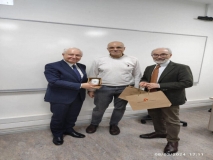
Prof. Pasquale's visit
Prof. Pasquale Daponte from the University of Benevento Sannio, Italy visited our Aerospace Engineering department during the period from 07.03 to 10.03 to discuss
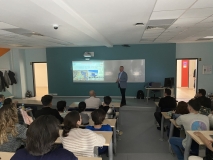
Presentation of Prof. Slawomir Szrama
Prof. Slawomir Szrama visited our university and Aerospace Engineering department during period from 04.03.2024 to 08.03.2024. He gave a talk about "Neural Networks
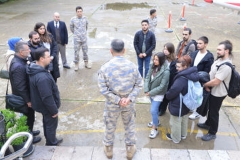
Technical Trip of The Aerospace Engineering Department to Gaziemir
A technical trip was conducted to the Aviation Sciences laboratories of the Air Force Non-Commissioned Officer Vocational School affiliated with the National
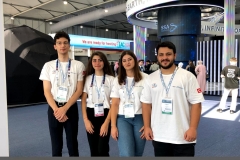
Award-winning helicopters promoted in Azerbaijan
Izmir University of Economics (IUE) students, who managed to receive awards at TEKNOFEST two years in a row with the cargo transport
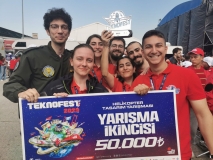
ECO-Dynamics places second in Teknofest Helicopter Design Competition with their attack helicopter
The "ECO-Dynamics" team, consisting of 7 students, Pınar Akın, Eda Nur Tetik, Kutlu Akar, Melisa Gündoğdu, Mehmet Ali Tekin, Tuna Deniz ve
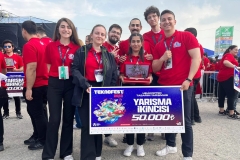
They came second with the helicopter design
The ‘ECO-Dynamics’ team, consisting of 7 students from Izmir University of Economics (IUE) Department of Aerospace Engineering,
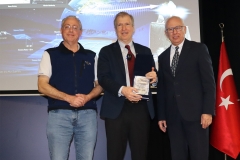
Visitor from NASA
Jay Trimble, Mission System Manager at NASA Ames Research Center, met with students at the two-day conference on NASA's Space Travel, organized


